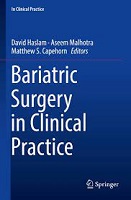Chapter 4 Obesity Is a Disease
Author(s)
Martin, William P.
Le Roux, Carel
Collection
WellcomeLanguage
EnglishAbstract
Obesity is a subcortical brain disease characterised by the pathognomonic symptoms of excessive hunger and/or reduced satiation after a meal. Distinct subtypes of obesity are recognised, although the rising incidence of polygenic obesity resulting from incompletely elucidated gene-environment interactions is of greatest public health concern. Obesity complications are well documented; their reversal with sustained intentional weight loss is a reason for optimism and motivation to seek treatments targeting pathophysiological mechanisms of obesity. Although lifestyle modification to achieve net energy deficit represents an important facet of obesity management, it is imperative to remember that hypothalamic dysfunction underpins this dysregulated state of energy metabolism and that solely appealing to patients’ cerebral cortices through motivational strategies will ultimately prove futile for many. Most patients will regain all the weight that they have lost if the treatment strategy does not make them less hungry and/or more satisfied with smaller meals (Dombrowski et al. 2014). Instead, we must expand our understanding of the pathophysiology of obesity and target our treatments to correct the subcortical brain disturbances which perpetuate aberrant feeding behaviours. Until our clinical tools improve, we can serve our patients better by recognising obesity as a disease and treating it with the same strategies and compassion we apply to all other chronic and disabling diseases.
Keywords
Obesity; diseaseDOI
10.1007/978-3-030-83399-2_4ISBN
9783030833985, 9783030833992Publisher
Springer NaturePublisher website
https://www.springernature.com/gp/products/booksPublication date and place
2022Grantor
Classification
Diseases and disorders


 Download
Download